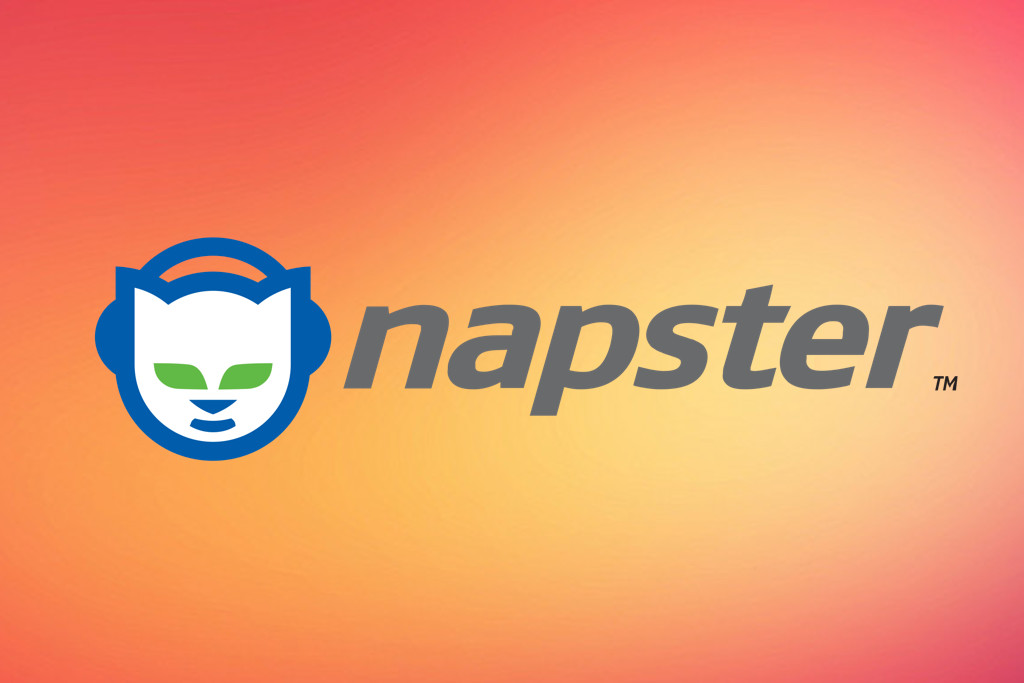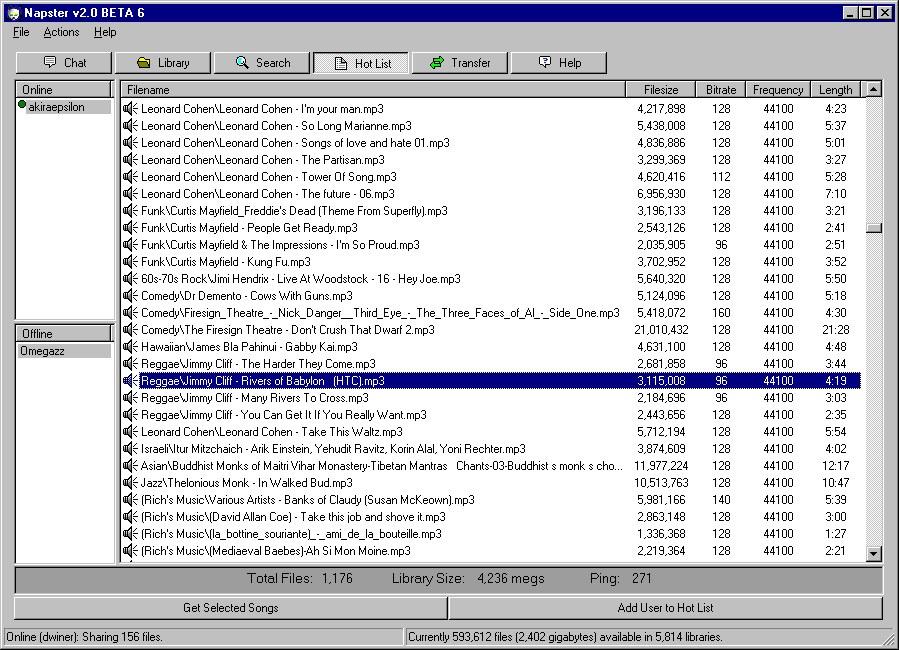An Ode To Napster, The Site That Broke The Music Industry (And Maybe For The Better)
Napster wreaked havoc across the music industry - but for music lovers, it was nothing short of a dream.

It scarcely seemed possible. Any song you could imagine, from any era, downloaded directly to your computer. To keep. For free.
And in 1999, with the internet hurtling at speeds up to 56,000 bits per second — as long as you were living in an area with good reception, and Mum didn’t pick up the phone to call your Aunt Karen — odds were high that you’d be blasting that ‘Enema Of The State’ album track in under half an hour. Definitely under 45 minutes. An hour, tops.
Napster was a music lover’s dream. Coupled with the recent rise of CD burners, a magical unit built into most turn-of-the-century computers that actually allowed you to make your own CDs for a dollar a pop, the entire recorded catalogue of the musical world was suddenly yours for the taking. And so, we took.
Sure, it wasn’t strictly legal, but it didn’t quite feel like stealing either. After all, if you shoplifted a CD, the store owner, the record label and the band all miss out. Someone else could have bought that tangible CD legitimately. It was a zero-sum game. MP3s multiply by mitosis. One file can spread like wildfire, and everyone’s a winner, baby.
Of course, we know now that bands and labels lost literal millions from illegally downloaded Napster files, but for a generation raised on recording films from TV, and taping songs from the radio, this seemed like the next (techno)logical step.
After all, they built CD burners into computers and pre-installed software that played MP3s. They wanted you to do this.

Memories.
A Teenage Fever Dream
Napster was launched in June 1999, by Sean Parker and Shawn Fanning, two teenage computer hackers that turned their prodigious programming skills into one of the most awesome and controversial services in the world. For a company that forever changed the music industry, the word ‘Napster’ now mostly elicits either high school memories or, for younger generations, blank stares.
It’s likely that Parker will mostly be remembered for being portrayed by Justin Timberlake in The Social Network; the guy who told Zuckerberg: “A million dollars isn’t cool. You know what’s cool? A billion dollars.” This is a line he almost certainly never said in real life, but given the FBI raided his family home when he was 16 because he hacked military databases, this is a fairly decent legacy.
For a company that forever changed the music industry, the word ‘Napster’ now mostly elicits either high school memories or, for younger generations, blank stares.
At its peak, Napster had 80 million registered users, all sharing MP3s with abandon. Occasionally an unreleased song or even an entire album would somehow leak onto the Internet, and you’d be listening to something as high-shelf as Radiohead’s Kid A months before it was released, privy to a secret preview that those still scouring CD stores for their musical fixes had no idea about. It was intoxicating. It felt secret and naughty. But harmless. And definitely not like stealing.
The Peril (And Unexpected Joy) Of Mislabelled MP3s
Of course, the unchecked nature of Napster also brought a lesser set of problems. Who among Napster users didn’t suffer through the time-suck of patiently waiting for a song to crawl onto your computer, only to have it sound like it was recorded by a dictaphone wrapped in a sock, in the pocket of someone sitting across the road from the recording studio?
Or it would be a completely mislabelled song, either mistakenly, due to human error or the perils of CD transfer, or — much worse — deliberately, by someone hoping to pass off their cacophonic caterwauling as a rare Jeff Buckley track.
Any motive for the latter outside of pure deceit remains unclear – you can either piss off a total stranger you’ll never have knowledge of or contact with, or you will make a new fan who will never have knowledge of or contact with you. Jeff Buckley will get all the credit for your masterpiece, and doesn’t he already get far too much credit for songs he didn’t write?
Radiohead and Blink-182 seemed to be the two bands whose fans suffered the most from misnamed Napster files. In 2016, The Ringer dedicated an entire feature to the cult of mislabelled Radiohead songs on Napster, an article I only stumbled across because my fiancee was telling me how she discovered one of her favourite songs, ‘Astronaut’ — which to this day she has no idea the actual origins of — through a mislabelled Radiohead MP3.
Similarly, I discovered Lit’s excellent 1999 album A Place In The Sun due to a track from it being erroneously labelled as a rare Blink song. I googled the lyrics and found a new favourite. I discovered many other pop-punk gems this way. I also discovered there is an extremely low bar for entry in the pop-punk world, and, in regards to spawning a legion of soundalikes, Tom De Longe begat vocal sinners at a rate only matched by Eddie Vedder.
Radiohead and Blink-182 seemed to be the two bands whose fans suffered the most from misnamed Napster files.
Misattribution aside, Radiohead were among the earliest acts to embrace the idea of music piracy — or rather, to recognise that the tide had forever turned and that they’d better quickly get OK with computers. The aforementioned Kid A leak was a result of their label offering pre-streams of the album, which were duly ripped and placed onto Napster. Fans matched songs to live bootlegs, sequenced the album based on an already-announced tracklisting, and we had Kid A.
It felt like sleuth-work by a network of tech-savvy fans. It didn’t feel like stealing. When it was officially released, Kid A was their first record to go to number one in America. They had never even had a Top 20 placing before. Napster had worked for them.
Years later, Radiohead offered up their 2007 album In Rainbows as a pay-what-you-want download, which for many meant exactly zero dollars. It didn’t matter. Months later, they released the physical version, which went to number one in the US and UK. You couldn’t help but think the band’s Napster experience played a big part in their confidence in this strategy.
The End Of The Napster Dream
For Napster, the beginning of the end came when Metallica drummer Lars Ulrich heard their song ‘I Disappear’ on the radio, which was a curious situation only because the song hadn’t been released yet.
He soon discovered Napster, and that their entire catalogue was available, for free. As darkness imprisoned him, and all that he saw, Lars and his bandmates launched what soon became known as the least rock and roll lawsuit of all time — Metallica vs. Napster Inc.
Although time has shown that Lars and co. were on the right side of history — with the lawsuit leading to legal models of downloading which allowed musicians to continue making an income, however diluted, from their recorded works — at the time of the suit, it seemed more like millionaires trying to have their biggest fans arrested, especially after their lawyers presented a list of thousands of Napster users who had stolen Metallica’s music. The incident left a bloody, metallic taste in the mouth of many fans.
Napster was forced to close down in July 2001, just over two years since it launched. The party wasn’t entirely over; a wealth of similar peer to peer file sharing services popped up in its place, and the advent of torrents and quickening internet speeds caused larger headaches as entire catalogues of music could be downloaded in seconds. And with wireless internet, Mum could even pick up the phone now.
The story of Napster isn’t about stealing, or paying, or even about sharing. It’s about easy access.
In the end, listeners just wanted things to be easy. The story of Napster isn’t about stealing, or paying, or even about sharing. It’s about easy access.
The rise of legal streaming services like Spotify prove that people are willing to pay good money for something they want, something they value as an integral part of life. They just aren’t willing to work too hard for it — especially if an easier option is available.
Nathan Jolly is a freelance writer based in Sydney, and was formerly the Editor of The Music Network, and tweets from @NathanJolly.
All this week, Junkee is heading back in time to relive the greatest moments in pop culture from 1999. For more 1999 content, head here.


